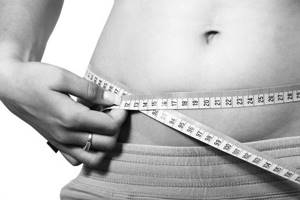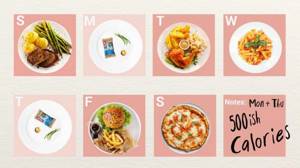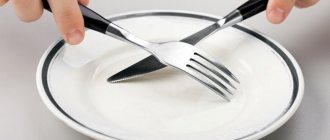There are 2 types of fasting - dry fasting and water fasting. Some methods of long-term fasting involve the use of both types. Sometimes fasting days on juices and vegetable decoctions are called fasting, which is essentially not true. In this article we will talk about water fasting - the least extreme form of fasting.
Water fasting is a complete abstinence from food (solid or liquid). Simply put, we don’t eat anything and drink only clean water at room temperature in sufficient quantity.
Important: The amount of water that you drink during your normal diet will not be enough during fasting! After all, solid food also contains water - when fasting, you should replenish the amount of water that usually comes with food! It is impossible to give exact recommendations on exactly how much water you should drink. Just drink more often. Sufficient intake of water helps eliminate toxins and prevents possible complications during fasting.
Something else important: While fasting, do not use a toothbrush or toothpaste to brush your teeth - the enamel may be damaged due to changes in the composition of saliva during fasting. Wipe your teeth with gauze and rinse your mouth with a decoction of chamomile and St. John's wort so as not to remove plaque that protects tooth enamel.
Fasting in some cases can pose a danger to health and life. At the same time, fasting is such an effective way to cleanse and heal the body that it can help you achieve ideal health and youth, recover from many diseases, including the most severe ones, and save lives. This article is for informational purposes only and the author is not responsible for the use of this information.
Fasting can last from one day to... several months, or even years. True, in this case it is no longer fasting, but a certain way of eating - life without food (pranoeating). The determining factor is the duration of water fasting . How many days the fast lasts depends on:
- The principle of water fasting is what processes occur in the body.
- The result of fasting on water is cleansing the body, losing weight, improving health and rejuvenation.
- The dangers of water fasting - precautions and possible negative consequences of fasting, which can be extremely serious if these precautions are not followed.
- Coming out of fasting on water is an extremely important moment.
So, let's look at what happens at each stage of water fasting (at different durations of fasting):
- Food break for up to 24 hours.
- One-day fasting on water.
- 2nd and 3rd day water fasting.
- Water fasting until acidotic crisis.
- Fasting after an acidotic crisis.
Why did the diet become so popular?
Regardless of what others say, let's be realistic: most people are interested in losing weight. And that is why new diets appear almost every day. However, fasting two days a week has benefits because it not only helps you shed extra pounds, but it can also improve your brain function, heart function, and boost your metabolism.
I restored old shabby bedside tables: very pleased with the result
We made a wood pattern on an accent wall: I’m sharing the beautiful result
How to soothe sensitive teeth: honey, green tea and other remedies
The beauty of this diet is that you don't have to significantly reduce your diet by more than one day. Of course, this day will be hard, but not like a 30-day diet, for example, when you have to follow a strict set of rules that prohibit bread and sugar. And it's not the endless tedium of counting calories for long-term weight loss, where you have to watch what you eat over months or years.
It works?
The 5:2 diet has not been thoroughly studied, but its close cousin, alternative day fasting, provides evidence to support the idea. Alternative day fasting works just as well as traditional diets for weight loss, according to research. However, fasting works better for some people, and researchers are trying to understand why. One study found that older people, for example, may do better on this diet, but it didn't take into account many factors, such as some people's access to healthy foods. Men and women have an equal chance on this diet.

I went to see her even after the divorce. Why did Evgeniy Urbansky's first marriage break up?
In just a few hours, the main cryptocurrency fell in price by more than 13%
I used old beams, removing what I could. The architect transformed the house (photo)
Benefits of Fasting
Other health benefits besides weight loss are not so easy to ignore. Scientists have long known that mice that are malnourished live longer. There have been many studies done to try to figure out what other benefits can be gained from calorie restriction. For example, fasting can help your body learn to better control your blood sugar. When you overeat, cells can become resistant to insulin, eventually leading to type 2 diabetes. Diet and exercise seem to be able to reverse this effect, but more needs to be known about how the body controls sugar when you're fasting so scientists can make recommendations. Unfortunately, there is not yet enough evidence to say that we know what actually happens in the body during fasting.

How does the duration of fasting affect
Hunger is stress for any living organism. Regardless of how many days it lasts, without the supply of nutrients, all vital systems are rebuilt, trying to save supplies for as long as possible. A person feels physiological and psychological malaise.
For physiological state
The state of the body and a person’s sensations are directly related to the duration and type of diet used. With a one-day (for some people two-day) fasting, no changes occur other than the feeling of hunger. There are no symptoms of discomfort. There is no pathological effect. The body has enough nutritious proteins to survive the period.

The photo on the Internet shows the result of uncontrolled starvation, which led to the disease - anorexia.
Long-term therapy affects physiological processes:
- loss of body fat and muscle mass;
- decreased secretion of glands;
- decrease in blood pressure;
- bradycardia;
- oxygen starvation of tissues;
- decreased immune defense;
- decreased muscle tone;
- drowsiness;
- depletion of blood composition;
- decreased libido;
- menstrual cycle disorders in women;
- heart failure.
With a dry diet (without water intake), dehydration develops, which is dangerous for the body. If you follow this technique, you must be under the supervision of a doctor.
For psychological
Not only the physiological component suffers. Refusal to eat affects the psycho-emotional state. At the stage of refusal to eat, depression, apathy, irritability, and anxiety are observed. A person becomes indifferent to himself, the people around him and circumstances. Consciousness is occupied by the thought of the desire to satisfy hunger.
Without the support of qualified specialists, a person may refuse therapeutic fasting at the initial stage. At the same time, having passed the crisis line, the condition returns to normal. The likelihood of failure after this stage is extremely low.
Author of a book with dietary recommendations
A book that explains the principles of the 5:2 diet, The Fast Diet, helps shed light on this issue. Its author is Dr. Michael Moseley, who has tried several fasting diets. He explains that he settled on the 5:2 pattern because it turned out to be a compromise between different methods. Essentially, his recommendations are based on personal experience and instinctive feelings. So, it will be up to you whether you decide to try fasting for two days a week, given the lack of scientific evidence. But if this diet works, then why not?

New Year in Wuhan, Melbourne, Vladivostok: thousands of people take to the streets
Ice cream with fir needles: a British chef suggests eating a New Year tree
Even after vaccination against Covid, wearing a mask is not canceled
My review - fasting is good for weight loss!
The practice of using long, 48-hour fasts once a week provides excellent weight loss results. Firstly, it reduces the total calorie intake per week, and fat burning occurs precisely over long “distances” . Secondly, the process of autophagy is launched - intracellular cleansing and rejuvenation of the body , and thirdly, there is an excellent cleansing of the gastrointestinal tract system . From my own experience, I can say that in two months of being on the periodic (interval) fasting system, I achieved excellent results - minus 10.5 kilograms, largely thanks to the weekly practice of 48-hour fasting. This practice also made it possible to quickly accustom the body to the right foods by zeroing out insulin resistance, that is, the body stopped requiring carbohydrate, sweet foods for life - and began to calmly process fat into energy.
What is a day of fasting like?
Most likely, you wake up thinking about breakfast. But given that you can only afford 500 calories a day, it would be wise to consume them throughout the day rather than in the morning. To avoid feeling hungry, you can cheat and turn your attention to drinks such as pure water, tea or coffee without sugar. Soda and fruit juices are not suitable as they contain a lot of sugar. If you can't beat your hunger, indulge in a vegetable snack that contains very few calories.
In any case, try not to eat until two o'clock. If you have problems concentrating at work, then at this time you can already allow yourself some real food. This can be a carefully measured portion of almost any food, as long as its calorie content does not exceed 250-300 calories. This will leave you with another 100-200 calories left over for dinner, which will keep you from going to bed hungry. For dinner, you can cook eggs, for example, and complement them with vegetables. Of course, such a dinner will not be too filling, but you can always remind yourself that the next day you will return to nutritious food.
In fact, the easiest thing to do is just stay away from the kitchen and keep yourself busy so you don't have to think about food. It's best to do fasting days when you're busy at work because you'll have a lot of free time on the weekends, which isn't good for your goals.

By calendar or month: choosing a suitable name for a boy in 2021
Juicy, beautiful, tasty. I cook meatloaf according to the simplest recipe
The workload on doctors is being reduced: coronavirus number 122 is also open on holidays
Changes in the body by day
After the body stops receiving the necessary nutrients, certain changes happen to it every day. Taking into account information about the development of consequences, fasting by day can be placed in a table.
| A day without food | What will happen in the body |
| 1 | If fasting began in the evening, the next day the person feels slightly unwell due to lack of food intake. Minor pain in the stomach and intestines. No physiological changes are observed. Loss of 100-200 grams of body weight. |
| 2 – 4 | Strong food excitement. There is obvious discomfort in the digestive tract. Nervousness, irritability, loss of concentration, and apathy towards the environment appear. The glycogen reserve is depleted, fats are dissolved for energy. Loss from 1 to 2 kg per day. |
| 5 – 8 | The feeling of hunger is dulled. A characteristic white coating forms on the tongue. Cloudiness of the urine and an acetone odor from the mouth are observed. The person feels weakness and pain in the joints. For proper brain function, fatty acids are used. Loss of up to 1 kg of muscle mass per day. |
| 9 -12 | Acidotic crisis is the most difficult period of the body’s transition to autonomous supply. Loss of up to 300 grams of body weight. |
| 13 – 20 | The body is being rebuilt. All processes slow down. Blood biochemistry changes. Blood pressure decreases, heart rate slows down. Symptoms of illness go away. Tongue coating is eliminated. The person’s psychological state is normalized. Weight loss – 200 grams per day. |
| 20 – 30 | Adaptation stage. The body is already accustomed to passive functioning. Minimal energy waste. The sclera of a person's eyes becomes light and bright. Skin condition improves. |
| 30 + | A second acidotic crisis must occur, less pronounced than the first. If fasting is not stopped at this stage, there is a risk of exhaustion and subsequent death. |
The longer a person goes without food, the more dangerous he is. If the fasting person is physiologically weak, changes can occur every hour.
What can you eat when you are not hungry?
On normal days you should eat “normally”. Of course, you shouldn’t overeat or dine on sweets and fast food. If you're following a healthy lifestyle, you'll know that vegetables, protein, and healthy fats are good choices. Naturally, the morning after a day of fasting, you will be more hungry than usual, although even then, it is quite easy to skip breakfast. However, this will not guarantee that you will not overeat. It turns out that people are more likely to overeat on days when they skip their morning meal.












